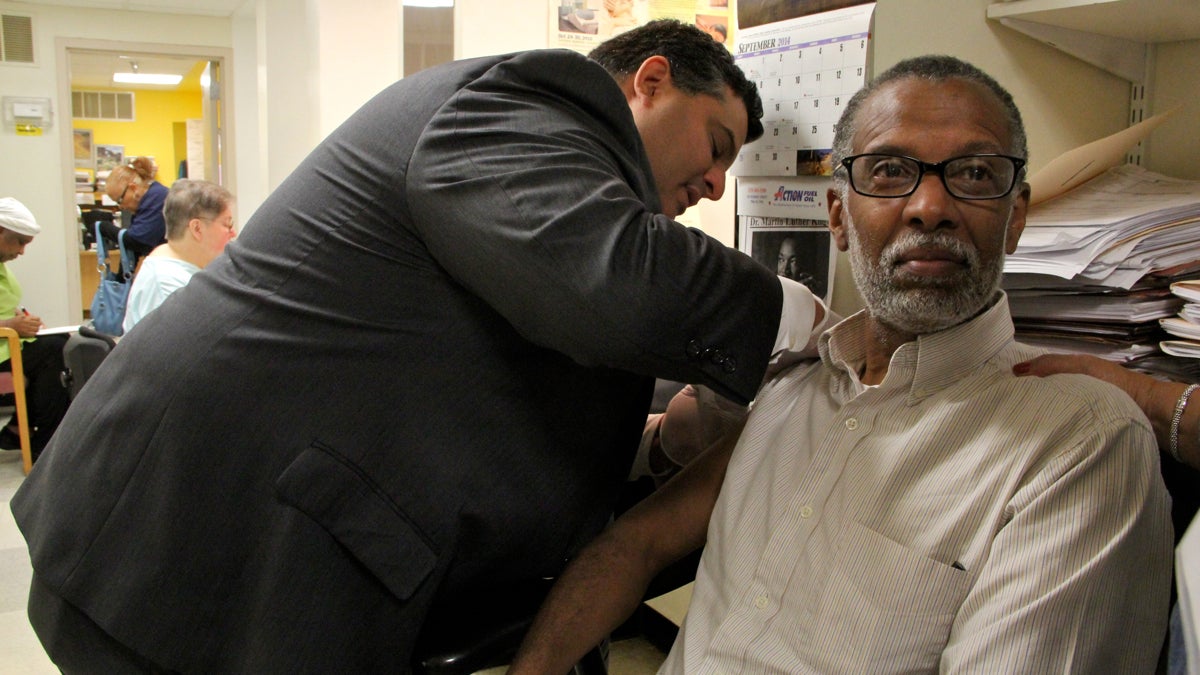It’s time for flu vaccination

Art Haywood, 57, gets a flu shot from Dr. John Cacciamani at Center in the Park senior center in Northwest Philadelphia. (Emma Lee/WHYY)
Federal health officials have released their annual reminder: Flu season is coming and most people should get a vaccine.
Attending a Centers for Disease Control and Prevention briefing in Washington, D.C., pediatrician Paul Offit recommended the nasal spray version of the flu vaccine for children from 2 to 8 when it’s available.
“Obviously, if the doctor doesn’t have the nasal spray vaccine then the shot should be given because you don’t want to miss that opportunity, but the ‘nasal spray’ vaccine is better frankly,” said Offit, an infectious disease physician at the Children’s Hospital of Philadelphia.
Both vaccines are safe, he said, but the nasal spray has produced better protection for the limited population of kids.
“Every year there are children who don’t have influenza who come into a hospital who catch influenza in the hospital, some of those children can’t vaccinated. They depend on those around them to protect them, that includes health care workers. I think it’s the job of every health care worker to get an influenza vaccine,” said Offit, who got his own flu shot at the meeting.
Each season the government tries to formulate vaccines to fight off the flu strains most likely to make people sick.
An array of vaccine options
Health officials say there are lots of safe vaccine options, including a high-dose version of the flu shot for older adults.
“As people age their immune system doesn’t respond as well. So when a person 65 and over receives influenza vaccine they are not going to produce as much antibody and therefore as much protection as somebody younger,” said David Greenberg, vice president of scientific and medical affairs for the high-dose drug maker Sanofi Pasteur U.S., in Monroe County, Pennsylvania.
The CDC does not offer a preferred recommendation for either the high-dose formulation or the standard vaccine.
A new study, funded by the drug maker, conducted at 126 research sites and published in the New England Journal of Medicine in August, found that Sanofi’s high-dose vaccine provided older people more protection.
Greenberg said Sanofi’s Fluzone High Dose could help reduce cases of “breakthrough” illness where people get sick even though they were vaccinated with the standard flu shot.
“So, now with the high dose, one out of every four of those cases — breakthrough cases — that would otherwise occur are now preventable,” Greenberg said.
Geriatrician John Cacciamani, who has no financial ties to Sanofi, advises older patients to ask about the high-dose option.
“Older adults are at higher risk for serious outcomes, and 90 percent of the death associated with the flu, are associated with people over the age of 65,” said Cacciamani, CEO of Chestnut Hill Hospital in Philadelphia.
Those over 65 are more likely to have health conditions such as heart trouble or diabetes that make it more difficult to fight off flu.
Across all populations in the United States, national vaccine rates for very young children and older adults are highest. About 65 percent of Americans 65 or older got a vaccine during the last flu season. The overall flu vaccine rate for Medicare beneficiaries in Philadelphia is about 50 percent.
“The vaccine is effective to the tune of 50 to 62 percent usually, so the vaccine doesn’t always get the job done,” said Cacciamani.
“If you look at it from a population perspective, that means you have to vaccinate a very large amount of the population to be able to have a really significant impact on the reduction of influenza spread,” he said.
Getting out the message
Center in the Park in Philadelphia’s Germantown neighborhood hosted an influenza education event Thursday. Marie Marthol-Clark, the center’s health promotion coordinator, said the event gives older people time to get their questions answered.
“There are quite a few misconceptions about the flu vaccine that make older adults wait or not do it at all,” said Marthol-Clark.
“People think that if they were vaccinated last year, then they’re good for a couple of years, and that’s not true at all,” she said. “They need to be vaccinated each year.”
Starting in December, the U.S. will publish the rates of flu vaccine for individual hospitals.
WHYY is your source for fact-based, in-depth journalism and information. As a nonprofit organization, we rely on financial support from readers like you. Please give today.

